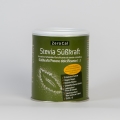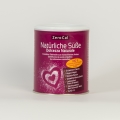ZeroCal is a crystalline sugar substitute, which has the same properties as traditional refined sugar with regard to the degree of sweetness, taste and processing possibilities.
ZeroCal is eccellently suited for health-conscious consumers, children and diabetics.
ZeroCal
ZeroCal Stevia
ZeroCal Stevia is a mixture between the sugar alcohol Erythritol and the steviol glycosides extracted from the Stevia rebaudiana plant. The minimum content of rebaudioside A amounts to 97%.
The mixture is composed in such a way that 1g ZeroCal Stevia corresponds approximately to 1g of conventional sugar. Thus, conventional sugar in food and beverages can be substituted by ZeroCal Stevia in a ratio of 1:1.
Mixing erythritol and steviol glycosides, synergies between these two substances can be utilized whereby the respective weaknesses are eliminated. Because erythritol by itself has a sweetening power amounting to a 75% of sugar and thus requires the use of a larger quantity than with conventional sugar. The same applies to the sole use of steviol glycosides, only the other way round. Since the sweetening power of those is about 350 to 400 times higher compared to retail sugar, it is hardly possible to completely replace sugar with steviol glycosides.
Stevia
The Stevia rebaudiana is a plant species in the genus stevia, of the composite family. Due to its strong sweetening power, this plant has been used for centuries as a sweetener. Originating from the northeast regions of Paraguay and the adjacent mountain regions of Brazil, commercial cultivation of stevia is found also in Japan and Spain. In Japan this natural sugar substitute has already achieved a market share of 40% on the sweeteners market. For 30 years stevia has been used in many products and declared safe for health.
Benefits of Stevia rebaudiana:
- is a completely natural and nonsynthetic product
- is suitable for diabetics and doesn�t raise the blood glucose level
- prevents tooth decay and is therefore toothfriendly
- aids the removal of toxins during digestion
- promotes quick healing of wounds by revitalising skin cells
- is calorie-free
- stable pH-value
- the steviol glycoside remains stable up to 200�C
Production:
The steviol glycoside is a natural sweetener which is extracted from stevia leaves. Dried stevia leaves are mixed with water, then the dissolved substances are precipitated by salts and decolored by special resins. This is followed by the phases of desalination and crystallization out of an alcoholic solution.This last step is repeated until steviol glycosides are present in sufficient purity. The stevia plant has several glycosides, but the main components are a total of eight: these are the stevioside, the rebaudioside A, B, C, F, the steviolbisode, the dulcoside A and the rubusoside. However, the rebaudioside A has the best sensory attributes of all four main glycosides (it is the sweetest and the least bitter one). The higher the Reb-A content the better the quality of the steviol glycoside.
We esclusively use steviol glycosides with a Reb-A content of more than 97%.
UE-approval
June 2008: a UN panel of experts of the UN attests harmlessness of stevia for human health. Subsequently, first individual applications for the use of stevia additives for sweeteners where approved in Switzerland.
March 2010: in Switzerland stevia is authorized for individual products, such as chocolate or iced tea. Moreover, stevia is available in supermarkets.
December 2011: The sweetener steviol glycoside is permitted as a food additive in the European Union under the code �E960�.
Erythritol
Erythritol is a sugar substitute permitted in the EU under the code �E968� since 2006. In Japan it is already available on the market since 1990 and in the US since 1996. In Scandinavia already 10% of all households regularly replace sugar with erythritol. The sweetening power of erythritol is equivalent to 75 % of normal retail sugar.
Production
Erythritol is produced by biotechnical methods combining enzymatic steps and subsequent fermentation by selected yeasts. In the process, starch is the basic raw material for the production of erythritol.
Contrary to other sugar alcohols (=polyols), in the production of erythritol no hydrogenation processes, which require considerable effort, are taking place, but there are only used traditional biochemical methods and processes. This also explains why erythritol can be widely found in nature: it occurs in fruits, vegetables and fermented foods. Even in the human body, in animals or in other kind of plants erythritol can be identified.
Which points in favour of erythritol:
- It contains no calories
- It is considered toothfriendly, as it inhibits the growth of bacteria
- It does not affect the plasma glucose level
- It is perfectly suitable for diabetics and has no influence on plasma glucose and insulin levels
- It is consumable for celiac disease patients and for people with lactose intolerance
- It does not contain fructose and is not converted to fructose in the body
- It does not contain any calories
- It has the same effect as an antioxidant in the body
F.A.Q.
Is stevia safe?
Generally, stevia is an all-natural herbal product, which has been used safely for centuries by the natives of Paraguay. It has been thoroughly tested dozens of times around the world and found to be completely non-toxic. It has most certainly been consumed in huge quantities (thousands of tons) over the last twenty years.
Can ZeroCal replace sugar in the diet?
Yes. Refined sugar does actually not contain any nutrients and, at best, provides empty calories in the diet. In the worst case, it contributes to the development of degenerative diseases.
Does ZeroCal raise my plasma glucose level?
Not at all.
Can ZeroCal be used by diabetics?
Diabetes is a disease that should be monitored and treated by a qualified physician. However, stevia and erythritol - since they do not raise plasma glucose levels - can be part of a healthy diet for people with plasma glucose problems.
What is not possible to do with ZeroCal?
Unlike sugar, ZeroCal can not be caramelized.
Is ZeroCal the same as sucralose and aspartame?
No, contrary to sucralose and aspartame, ZeroCal is 100% natural. Sucralose and aspartam, like most of the sweeteners available in the market, are artificial products. They are produced in the laboratory and have a sweetening power more den a hundred times higher than that of conventional sugar. They are so sweet, that in order just to enable the dosing, a high calorie filler, like maltodextrin or dextrose, must be added. Whereas ZeroCal is used in its purest form, has the full volume of sugar and therefore needs no fillers. Neither does it contain any free-flow agents or other additives.
Is Zerocal the same as fructose?
No. Fructose is a kind of sugar and, exactly like common sugar, it contains 400 calories per 100 grams. Zerocal is not a sugar but a natural sweetener and contains no calories.
Is erythritol a carbohydrate?
Erythritol is defined as a carbohydrate, but it does not act like a common carbohydrate, like sugar or starch. In fact, eritritol is not converted into energy in the body but escreted with the urine. It needs not be taken into account when calculating the bread units, nutritional values of bread or carbohydrates. It has proven to be ideal for diabetics and for people who wish to follow a calorie-conscious diet.
Is ZeroCal free of genetic modifications?
The ingredients contained in Zerocal come from controlled agricultural cultivation. There are no pesticides being used in the cultivation and no genetically modified plants used in the production of ZeroCal. This, as well as the perfect quality is regularly reviewed and certified by internationally renowned analytical laboratories.
Back to top
 ZeroCal
ZeroCal

 Download PDF
Download PDF 
 Download PDF
Download PDF